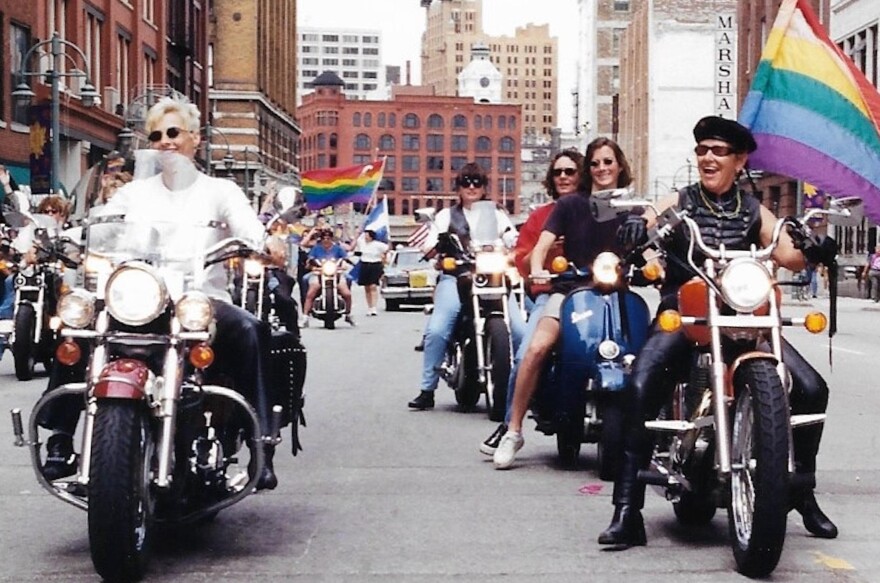Serial killer Jeffrey Dahmer rose to infamy after human remains were found dismembered and preserved in his Milwaukee apartment. He murdered at least 16 people in Milwaukee. Fourteen were people of color and many of them had been part of the city’s gay community.
A Bubbler Talk question asker wanted to know how much harm Jeffrey Dahmer’s crimes caused Milwaukee’s gay community. But to understand Dahmer’s impact, we first need to look at what life was like for LGBTQ Milwaukeeans in the 1980s.
“You essentially have a community that grew up being told that they really had no right to exist. You had a community who really only knew each other out of a sense of shame, out of a sense of disenfranchisement, out of a sense of being cast away," says Michail Takach, curator of the Wisconsin LGBTQ History Project.
He describes it as an underground community, where people used nicknames to obscure their identities. They met at bars in a dark, industrial neighborhood surrounded by partially empty factories and warehouses. He says that people were also pretty transient.
“You would see somebody and they would be around all the time and then they would just be gone and you would really not think about it or not really question where they had gone,” Takach explains.

In 1987, when Dahmer began preying on people in Milwaukee, it was the height of the AIDS epidemic. According to the CDC, more than half a million people were living with HIV by 1987 in the United States. Scott Gunkle was a bartender at the 219 Club, where Dahmer was a regular customer. Although he met Dahmer a few times, Gunkle found him unremarkable.
What Gunkle remembers vividly is how AIDS was ravaging the community.
“One year I went to 19 funerals, and it was just devastating. Every other week you’d find somebody that passed away. I would talk to other people who knew certain people and say, ‘Where’s so-and-so,’ and they’d be like, ‘Oh, he passed away,’ or, ‘Oh, he’s sick and he’s in a hospice,'" Gunkle recalls.

In 1991, Dahmer was finally caught after one of his victims managed to escape. As the gruesome reality of his crimes became known, it was truly shocking for the community.
“No one had any suspicion at the time. I mean it wasn’t as if there was, you know, this long string of disappearances and people pieced it together. There was no suspicion of anything like this happening while this was happening," says Takach.
He and Gunkle say that for a short time after Dahmer’s crimes were revealed, people were nervous about going out.
“There was a buildup of paranoia for a while, but it really didn’t last. I don’t think it lasted more than a couple months, to be honest," says Gunkle.
And in some odd way, Dahmer’s crimes actually led to systemic changes that helped Milwaukee’s LGBTQ community. Although Takach is careful not to give Dahmer’s crimes all the credit, the nicknames went away in the early 1990s. People were emboldened to be open about who they were, which made them safer.
“Being able to be your true self every day kind of eradicates some of these dangerous situations that people put themselves in just to find acceptance, just to find a community, and just to find a sense of caring and love," Takach explains.
Others, like Gunkle, were drawn to activism. He started to lead sensitivity training for the Milwaukee Police Department.
“Activists got more engaged with the police department, activists got more engaged with the African American community, communities were willing to reach out to one another," he says.

There’s no doubt that for some outsiders, Dahmer’s gruesome crimes became the defining symbol of Milwaukee’s gay community. But for the people who made that community, it was just another part of a long history of abuse — and they weren’t about to let these monstrous acts define them.
"The resilience of the gay and lesbian community in Milwaukee cannot be overstated, and Jeffrey Dahmer was just a fly on the windshield," says Takach.
Milwaukee’s LGBTQ community has come a long way since the 1980s. But that resilience, that’s what brought them here. Not Dahmer.
Have a question you'd like WUWM to answer? Submit your query below.
_
Editor's note: This story was originally published June 26, 2020.







